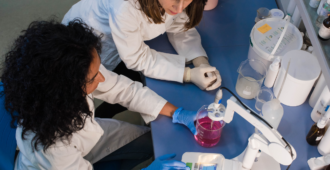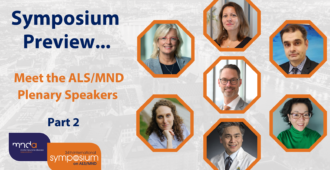Scientists from the University of Oxford have set up ‘Families for the Treatment of Hereditary MND’ (FaTHoM), an initiative to bring together the community of families affected by inherited forms of MND. Their first meeting will take place in Oxford on Tuesday 18th April.
Most people living with MND cannot identify a relative who has also had the condition. However, around 5% of people with MND will have a family history of the disease, which is known as inherited or familial MND. This happens when a single faulty gene is passed down from parents to their children across number of generations.
Genes come in pairs and the probability of inheriting a faulty gene from an affected parent is 50:50 as we are just as likely to receive the other ‘healthy’ copy of that gene instead. Even if the faulty copy is the one passed on, development of the disease itself is not inevitable as it is based on other factors too (e.g. certain environmental and lifestyle influences).
Research has successfully identified several mutated genes responsible for inherited MND. The main ones are called: C9orf72 (found in 40% of familial cases), SOD1 (20%), TARDBP (<5%), FUS (<5%). Together these four account for 70% of cases. At present, it is not possible to identify the faulty gene in the remaining third of MND patients with a family history. Recognising these genes as responsible allows people already diagnosed with MND and who have a family history, to undergo testing to understand more about the cause of their disease. For researchers, understanding the molecular pathways controlled by these genes takes them closer to the targets needed for more effective treatments. It is hoped that such treatments might benefit all those living with MND, even without a family history of the disease.
If a person already diagnosed with MND is concerned about the possibility of a family history, and what that could mean for their relatives (in terms of inheriting the genetic code), they may wish to consider genetic testing for themselves. Choosing to be tested can be a difficult decision, as a positive result might have implications for other family members. Equally, having a test can be a useful way to provide other family members with valuable information to allow them to make decisions. Before any testing is undertaken, however, it is recommended that these issues are discussed in detail with a neurologist specialising in MND, or a clinical geneticist.
The FaTHoM initiative aims to provide information for people affected by inherited MND, including about how to participate in research. This first event is a meeting led by Professor Martin Turner and Professor Kevin Talbot, consisting of expert talks on key issues affecting such families. It is open to any person living with an inherited form of MND, and a close relative of those who have been affected by inherited forms of MND. To view the programme of the meeting or to register, visit this link or email lynn.ossher@ndcn.ox.ac.uk
For more information on inherited MND, please see our website or our range of information sheets for an overview of inherited MND, genetic testing, and options when starting a family.
We would like to thank Prof Martin Turner for his comments and revisions of this article.






I am the first person in the uk to receive a new treatment for SOD1 type MND,,tomorrow the 20/02/2017 I receive the last of five treatments it’s via a lumber puncture let’s hope it makes a difference,and leads to a better life for many.this treatment is at Sheffield Hallamshire Hospital under the expert guidance of professor McDermott and his dedicated team,I can’t thank them enough
Where will the next venue be. Hopefully in the north of England to allow accessible to a wider target population.
Dear Valerie,
Thank you for your comment.
We do not yet know the frequency (and therefore details such as location and date) of the FaTHoM initiative meetings. However, as soon as we have any updates, we will advertise it widely.
We also aim to provide information from this meeting to those who could not attend via short communications (such as a blog).
Regards,
Martina
Thanks for the above information I am keen to attend a meeting. A blog is good but not as nearly as personal or has the ability to get true experience and opinion across.
Dear Valerie,
I hope you will get a chance to attend and get as much information as possible from the meeting.